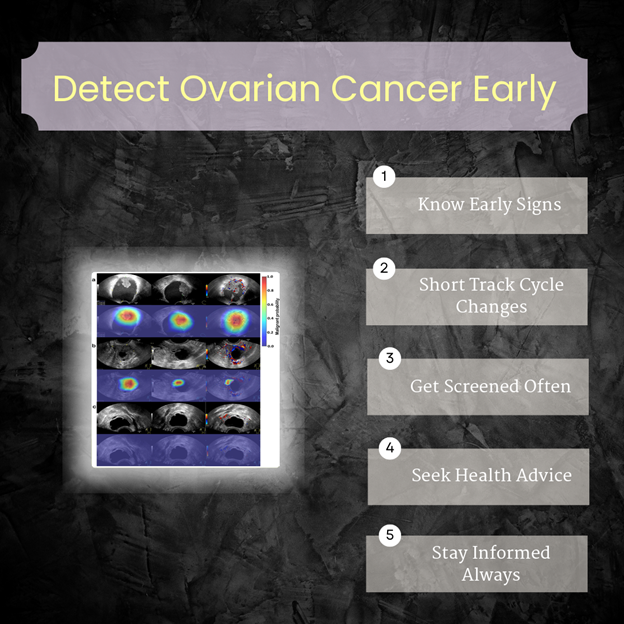Ovarian cancer holds a significant place in women’s health issues due to its tricky nature. It’s crucial to spot it early to improve treatment results. Often labeled silent, its early discovery results in heightened survival rates. Educating and empowering oneself can translate guessing games into life-saving acts. Early recognition of symptoms can make all the difference. By equipping yourself with information, you can protect yourself and those you love.
Unmasking Ovarian Cancer
In simple terms, ovarian cancer begins in the ovaries, part of the female reproductive system, or the normal pelvic organs. Despite its significance, it’s often referred to as a “silent killer”. The early symptoms are subtle, which leads to late detection. The vague nature of symptoms can easily be mistaken for less serious health issues. As a result, many women realize they have it in the later stages, turning the clock against them.
The Life-Saving Role of Early Detection
Spotting ovarian cancer promptly could equate to saving lives. The chances of overcoming the disease are remarkably higher when caught early. Unfortunately, many cases pass under the radar due to the vagueness of symptoms. Statistics show only a small portion of women receive an early diagnosis, but knowing the signs gives one a fighting chance.
Spotting Early Warning Signs
– Persistent Bloating: Feeling bloated every now and then is normal. But ovarian cancer often causes bloating that doesn’t seem to go away. If you notice unusual bloating for weeks, it’s worth noting.
– Pelvic or Abdominal Pain: Be aware of continual pelvic or abdominal discomfort. Those cramps might not seem significant, but they could hint at something more. Consistent pain that doesn’t ease should push you to ask for medical advice.
– Changes in Appetite: Another clue can be feeling full quickly after small meals or a noticeable drop in appetite. If you notice your eating patterns changing for no clear reason, ovarian cancer may be a suspect.
– Urinary Symptoms: Needing to urinate often or feeling an urgency that’s out of the ordinary might signal an issue. In concert with other symptoms, these could be important ovarian cancer signs.
If you’re experiencing these symptoms consistently, it’s crucial to act early and seek advice.
Untangling Misconceptions About Symptoms
It’s really easy to dismiss ovarian cancer symptoms as mere inconveniences. Most link them to everyday health bumps. But here lies the importance of knowing what’s normal for your body. Any change that seems off from your baseline should flag your attention. Being proactive means catching what others might miss.
Guidance on Seeking Medical Attention
When symptoms persist, don’t hesitate to see a doctor. Share every detail, even if it feels minor. Communication is key. Give your doctors as much context as possible about your symptoms’ duration and intensity. It’s also about trusting your gut feelings. You’re the best advocate for your health, and persistence can lead to answers.
Navigating Medical Evaluations
Visiting the doctor for a potential ovarian cancer evaluation might seem daunting. Here’s how it usually unfolds:
- Initial talks about symptoms and personal health history.
- Physical exams focusing on abdominal and pelvic areas.
- Possible imaging tests like ultrasounds to get a clearer view.
- Blood tests looking for cancer markers.
If ovarian cancer is suspected, subsequent steps could include further consultations with specialists and possibly more elaborate tests. Always keep communication lines open and don’t hesitate to ask questions or express concerns.
Understanding Risk Factors and Preventive Steps
Certain elements increase the risk of ovarian cancer:
- Genetics: Having a family history increases risk.
- Age: It mostly affects women past menopause.
However, adopting a healthy lifestyle and regular check-ups can act as protective measures:
- Balance diet and regular exercise can boost overall health.
- Routine health screenings help catch any deviations early.
Being proactive about health minimizes risks significantly.
Proactive Measures: Self-Care and Support
– Maintain a Symptom Diary: Note down any unusual patterns.
– Build Your Network: Lean on family, friends, and healthcare providers for support.
– Participate in Support Groups: Community connections are invaluable sources of strength.
These acts foster understanding, support, and empower decision-making.
Partnering with Medicover Cancer Institute
Medicover stands at the forefront of ovarian cancer diagnosis and treatment in India. They offer a range of services, designed with compassionate care at their core. From initial screenings to personalized treatment plans, their services guide patients every step of the way. Medicover also leads in genetic counseling, offering deeper insights into ovarian cancer’s genetic links. Their teamwork with leading research initiatives ensures that the latest advancements benefit their patients. Medicover’s comprehensive approach truly supports patients through their journeys.
Closing Thoughts and Key Reminders
To summarize:
- Look for persistent bloating, unexplained pain, shifts in appetite, and unusual urinary changes.
- Staying informed helps detect ovarian cancer early.
- Reassurance comes with understanding: while these symptoms don’t always mean cancer, awareness remains a crucial step.
Share this information. Spread awareness. Knowledge equips us all with power. Most importantly, stay vigilant and proactive.
Ovarian cancer awareness can save lives. Let’s be informed and ready to act.

